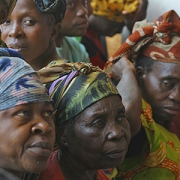Women as Agents of Change in the Aftermath of Humanitarian Emergencies

Photo credit: Matt Abud, Internews
Suffering does not end with the cessation of hostilities or the phase-out of large-scale humanitarian aid. Sri Lankan women endured many unspoken hardships throughout the 30-year conflict, and continue to struggle as former IDPS with no home to speak of; with painful memories of the loss of family members; as victims of domestic violence; rape and alcoholism among men; supporting households as war-widows; or just having watched the opportunity for their lives to improve fade away. Despite these experiences, women remain significant, untapped agents of change, both within their local communities and across ethnic divides. Internews, with local partners such as the Association for War Affected Women (AWAW), will train women to use media tools to a) document their experiences, b) access essential information to enhance their economic empowerment, c) collaborate and reconcile with women from other local communities, other ethnic communities and across the diaspora and d) participate in policy decisions that affect them. Beyond the immediate impact of the radio, social media and newsletter products, Internews and partners will develop a toolkit for gender-based recovery and reconciliation in other conflicts. This project will build upon Internews’ successful Lifeline humanitarian information project that end in September 2010, and will help bridge the gap between humanitarian and development aid.
This was taken from Internews’ statement of commitment from the Innovative Use of Technology for Humanitarian Media Aid – Clinton Global Initiative Commitment to Action. Contact Jeri Curry at Internews for more information.





































